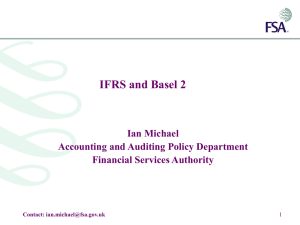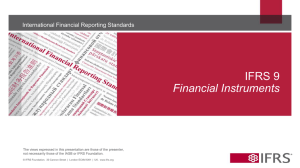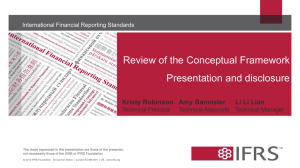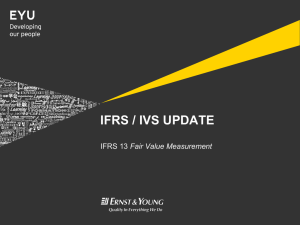Raffournier_Paris_2008
advertisement
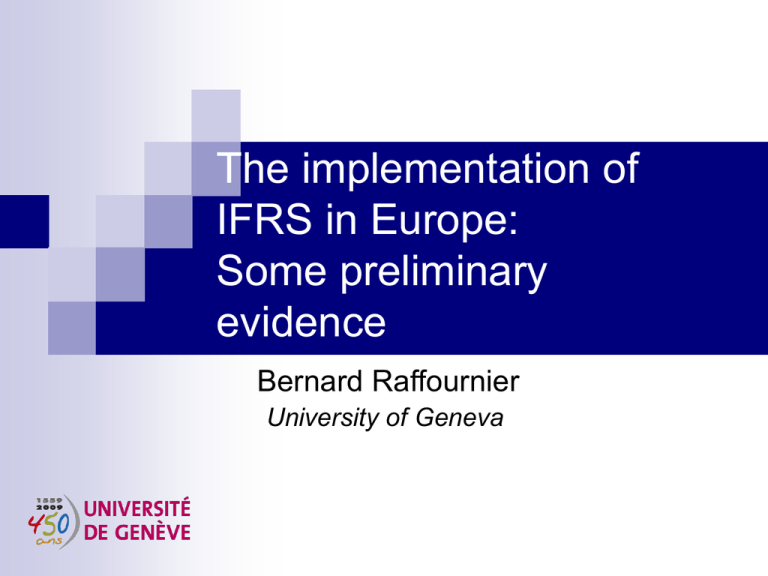
The implementation of IFRS in Europe: Some preliminary evidence Bernard Raffournier University of Geneva Since 2005 all listed companies in the E.U. must comply with IFRS In Continental Europe, IFRS adoption represents a major change: replacement of stakeholderoriented accounting regulations by marketoriented standards heavily influenced by the Anglo-Saxon accounting model Aim of this presentation: Review the empirical evidence on the economic consequences of IFRS adoption The expected consequences of IFRS adoption Information asymmetry should decrease: IFRS are more market-oriented IFRS disclosure requirements are larger Earnings management should decrease: IFRS are more precise They admit a limited number of options Hidden reserves are prohibited Accounting data should be more value relevant Value relevance: Ability of accounting data to reflect contemporaneous market prices or returns IFRS-based earnings should be more value relevant: IFRS are more market-oriented Earnings management is more difficult under IFRS IFRS make a larger use of fair value The cost of capital should decrease Effect on information asymmetry Has the bid-ask spread declined? YES: Germany: Leuz & Verrecchia (JAR 2000), Gossen & Sellhorn (WP 2006): Companies using IFRS exhibit smaller bid-ask spreads than those using German GAAP Europe: Platikanova & Nobes (WP 2006): On average, the bid-ask spread declines after IFRS adoption BUT: Switzerland: The effect is limited to small companies: Dumontier & Maghraoui (CCA 2006) Are analysts' forecasts more accurate? YES: Ashbaugh & Pincus (JAR 2001): Analyst forecast accuracy improves after IFRS adoption Hodgdon et al. (JIAAT 2008): Compliance with IFRS reduces analyst forecast errors Germany: Ernstberger et al. (WP 2008): Forecast accuracy is higher for estimates based on IFRS or US GAAP data than for those based on German GAAP figures NO: Germany: Maghraoui (PhD 2008): Compliance with IFRS does not reduce the dispersion of analyst forecasts or forecast errors Europe: Cuijpers & Buijink (EAR 2005): Dispersion of analyst forecasts is higher for firms using IFRS or US GAAP than for those using local GAAPs Effect on earnings management Does IFRS compliance restrict earnings management? NO: Germany: Van Tendeloo & Vanstraelen (EAR 2005): IFRS adopters do not present different earnings management behavior compared to companies reporting under German GAAP Sweden: Paananen (WP 2007): IFRS adoption does not reduce income smoothing. Germany: Lin & Paananen (WP 2008): Earnings management is higher in the post IFRS-adoption period YES: Barth et al. (JAR 2008): In the post-adoption period, firms applying IFRS evidence less earnings management Effect on the value relevance of accounting data Has value relevance of earnings increased following IFRS adoption? YES: Barth et al. (JAR 2008): Firms applying IFRS exhibit more value relevant accounting figures than other companies Germany: Bartov et al. (JAAF 2005): The value relevance of IFRS-based earnings is higher than that of German GAAPbased earnings Germany: Jermakowicz et al. (JIFMA 2007): The value relevance of earnings is higher for DAX-30 companies using IFRS or US GAAP NO: Germany: Hung & Subramanyam (RAS 2007): IFRS adoption has no effect on the value relevance of book value and net income Sweden: Paananen (WP 2008): The value relevance of accounting figures is not affected by IFRS adoption Germany: Lin & Paananen (WP 2008): The value relevance of equity and earnings decreases after IFRS adoption Effect on the cost of capital Has the cost of equity capital declined after IFRS adoption? YES: Germany: Ernstberger & Vogler (WP 2008): The cost of equity capital is lower for companies that adopted IFRS or US GAAP Kim & Shi (WP 2007): The cost of equity capital is significantly lower for IFRS adopters NO: Europe: Cuijpers & Buijink (EAR 2005): No evidence of a lower cost of equity capital for IFRS adopters Germany: Daske (JBFA 2006): Voluntary IFRS adopters do not exhibit lower cost of equity capital Has the cost of debt declined after IFRS adoption? YES: Kim et al. (WP 2007): IFRS adopters have lower interest rates, larger amount of loan facility, less restrictive loan covenants, and they attract more foreign lenders Summary of the empirical evidence No clear conclusion can be drawn from these studies because: The evidence is mixed Many studies were conducted in a single country (Germany in particular) Most studies deal with voluntary adoption Explaining the conflicting evidence The impact of IFRS adoption is a function of the degree of compliance with IFRS Vogel et al. (WP 2008): There is considerable variation in the level of IFRS compliance among European companies (compliance index ranging from 13% to 100%) Daske et al. (WP 2007): "Serious" IFRS adopters experience stronger effects on the cost of capital and market liquidity than "label" adopters Hodgdon et al. (JIAAT 2008): Compliance with the disclosure requirements of IFRS enhances the ability of financial analysts to provide more accurate forecasts The impact of IFRS adoption is a function of the firm's incentives to comply with IFRS Germany: Christensen et al. (WP 2008): Improvements in accounting quality are confined to firms with incentives to adopt IFRS Daske et al. (JAR 2008): The capital-market benefits of IFRS adoption occur only in countries where firms have incentives to be transparent and where legal enforcement is strong Wang & Yu (WP 2008): Better accounting standards are helpful only in countries with proper reporting incentives i.e. in commonlaw countries, in countries with better shareholder protection and effective legal enforcement Kim & Shi (WP 2007): The cost of capital-reducing effect of IFRS adoption is greater when the IFRS adopters are from countries with weak institutional infrastructures Conclusion The adoption of IFRS will probably not be sufficient to standardize the quality of earnings throughout Europe Strong enforcement mechanisms (laws and corporate governance systems) also are necessary Adopting high quality standards might be a necessary condition for high quality information, but not a sufficient one (Ball et al., JAE 2003)
